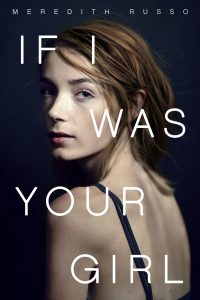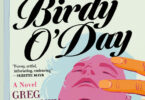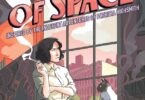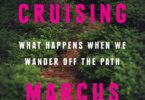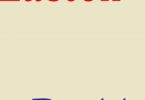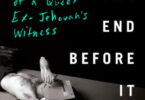Reviewed by Casey Plett
“I never thought love was real. I didn’t. And now I think life isn’t real without it———that sounds like a really bad greeting card—”
“—Don’t. Don’t make it a joke.”
—Comet
If I Was Your Girl by Meredith Russo is a great book, which is nice considering it’s the first widely distributed trans YA book by a trans woman.
1
I can’t do this without spoilers so first an overview without them. The plot: Trans girl Amanda Hardy, eighteen and a couple years on the lady pills, leaves the Atlanta burbs for the Tennessee sticks to live with her estranged dad and finish high school. Her plan is to be deep stealth, keep her grades up, make nice with Pop, then warp out of the South upon graduation. But: The town kids find Amanda every inch the pretty fascinating new girl, and both lady friends and eager boy suitors immediately park themselves in her life. She tries to keep a low profile and her trans status secret, but she finds herself loved and living for the first time, and secrets become hard.
The book is charming and fun and contains well-earned cheese and unavoidable shittiness—though less of the latter than you might think. I breezed through it with joy both when I read it in January and again re-reading it just now. Some characters are better developed than others: the outcast friend Bee and the loving but hapless dad are particularly vivid and complex. Amanda’s descriptions of being trans ring very, very true to me, and as much as I hesitate to say this given the political yoke with which we saddle The Youth, this really is a book I wish I’d had when I was a teenager (Flatiron Books, that’s a line I forbid you from lifting for future promo). The ending in particular makes me weep to think a young trans girl might read it and take it to heart.
Recently I’ve longed for a trans story that can do simple and sweet without a trainload of dealbreakers attached (*cough* Boy Meets Girl *cough*). If cute teen romances are not your bag, If I Was Your Girl won’t convert you, but if they are, buy this fucking book. And school librarians: Please, please put it in your library.
2
When I read If I Was Your Girl, I can feel my teenage body as I read it. It’s a strange, prickling sensation, a deeply internal and physical thing that reaches into my specific flesh and bones, the kind of sensation that cis writers, for all they annoyingly try (and try, and try, and try) can just never get across.
I read YA mostly in my preteens, around the turn of the millennium—both the light and easily available stuff like Gordon Korman and Star Wars books, but also Cynthia Voigt, Judy Blume, Robert Cormier. The stuff about kids against shitty odds who, at best, don’t get out unscathed. My problems as a kid didn’t stop at being trans, but Voigt and Cormier especially connected me to those dark corners of my psyche I couldn’t access, including the bodily shut-downs and despair I couldn’t articulate when I was younger.
When I read If I Was Your Girl, I found myself reading with the eyes of the ghost of a girl I was when I was ten, or eleven, or twelve. It’s weird. Even though Amanda is an effortlessly passing feminine eighteen-year-old, the body I read this book with is my awkward big early-puberty boy-body, containing both the fear and jumpiness I had toward other children as well as the dreams and wonder I held for a better, more loved life.
Yet unlike the teenage material I was attracted to when I was that reader, If I Was Your Girl is not a dark book, despite the suicide, rape, and violence found in the text. I felt none of the bleakness that came with books like The Chocolate War. The emotional place I travelled to felt more like watching movies like 10 Things I Hate about You, or maybe reading Judy Blume with the uplifting-to-sad-scene ratio turned up a few notches. The emotions popping on the page for me were humour, relief, and joy as Amanda is allowed to do happy teenage girl things for the first time—dance in a crowd and feel a strange comfort in the crush of bodies, shop for a homecoming dress with her friends, play the honesty game, and skip art class in a secret hideaway. It really feels like a pleasant book. It’s not a bad thing.
Part of this, I know, is my own personal experience with the soup of fears and traumas Amanda experiences, some blessedly alien, some so numbingly familiar I blinked past them. Yet the majority of page time in If I Was Your Girl is objectively about people loving a kid who hasn’t gotten a lot of love. I didn’t mind hanging out with her and seeing her get it.
Which isn’t to say the book’s two-dimensional. There’s a lot of dynamic tension between the characters and thankfully, Russo doesn’t stake it all on Amanda’s “secret.” (Also, when everyone does find out about Amanda’s status, it occurs refreshingly unexpectedly. I was expecting to see the Big Reveal coming ten miles away; I didn’t.) Amanda’s new boyfriend Grant is cagey and private himself; Amanda eventually discovers he works overtime to barely support his family. His family is kind to her and also very religious—there’s a beautiful and, to me, very personally compelling scene where Amanda goes over for dinner, watches them say grace, and is warmed by their closeness, bound by the boy she loves while haunted by the impossibility of fitting into their lives. The weirdo girl Bee and the gaggle of popular girls both win Amanda’s friendship but don’t much like each other, this simmering conflict further complicated by the fact one of the girls, Chloe, is closeted and smooching Bee in secret herself. (Amanda also sees in the veiled-butch Chloe a mirror image of herself when she was younger and it’s kind of touching.)
Bee is definitely the most realized character in the book: the smart one cutting through Amanda’s bullshit, the kind and gentle one tolerating Amanda’s neuroses and naïveté, the brusque one filled with bitterness and spite, and also sometimes she gets stoned and is a dreamy pothead. The town definitely hasn’t been good to Bee, and there’s a visceral underbubbling of jealousy for Amanda who waltzes in and gets it all—football-star boyfriend, popular friends, a nomination for homecoming queen. She felt the realest of all the supporting kiddos, and when she betrays Amanda in a spurned drunken rage, I could still feel and empathize with her anger. It’s heartbreaking. It’s not as simple as the friend is now the villain; it’s tougher than that.
But it’s Amanda’s dad who captured my heart more than anyone. This hapless, unhappy man flailing to protect a kid he abandoned years ago (his functional alcoholism doesn’t seem to help). He and Amanda have nice moments, then blow-ups; resigned fights, then warm embraces. It was such a real portrayal to me, where you re-unite after some shitty estrangement but still there’s all this shit and it’s like, okay, now fucking what?
Bee and Dad have similarities in that respect. They’re the most interesting and unpredictable, they clearly know Amanda the best, and they also mess up her life in unexpected ways. When Amanda comes home scared and exhausted after Parker (the book’s unambiguous and frightening antagonist) gives her a black eye and tries to rape her, she just wants to go to bed and forget the night happened. But Dad sees her face, concludes Grant did it, and drives off not listening to Amanda’s protests, only to make a bigger stew of things: he punches her sweet boyfriend, whose mother then intones that Amanda’s a faggot. The father isn’t strong, in many lights isn’t that good of a man—he gives up after that night and sends Amanda back to her mom—but he’s trying to love his kid and his character is realized, three-dimensional, and honest, an average guy in over his head, trying to fix his mistakes and failing almost every time. (He does eventually agree to have Amanda come back and live with him again after he’s calmed down.)
(And yes, I do still maintain it’s not a dark book.)
3
The love story between Amanda and Grant is generic and also totally sweet. He takes her for picnics, shows her the old swimming hole, lets her show him Amélie. Amanda’s worried about him finding out she’s trans, of course, and at one point writes out a confessional letter of her entire past. He burns the letter on the spot in a dramatic teenage boy I-don’t-care-what-your-secrets-are-I’ll-always-love-you gesture. The love story won’t be everyone’s cup of tea, but I liked it—I liked it with all my crying-at-dumb-romantic-comedies heart. Call it my own fucking issues, whatever, it’s just fucking nice to read about this trans girl being treated so sweetly by a boy.
And it’s with Grant where the book ends. He reacts to Amanda’s outing with a mixture of dumbfoundedness, concern, and mild shittiness, and though he’s earlier foreshadowed as not-terrible in this department for ferociously defending an old gay friend in the past, the predictably open question hangs over the last few chapters: Will the All-American sweetheart manage to be there for his trans girlfriend when she comes back to town? And Russo does something very lovely here: she doesn’t tell us. I really appreciated this. Sweet teenage romance or no, you’ll never sell me on a climax that depends on whether a cis person will tolerate transsexual existence. Grant falters at one point during her reuniting and says, “I wish you were never … I wish you were always …” Timid Amanda reponds:
“No,” I said, the strength in my voice surprising me, that one word so clear in the empty space. He sniffed and shifted his weight. “I was always a girl, always,” I said, my eyes burning. “See you around, Grant.” I turned and started to walk away but he grabbed my shoulder.
“I wanna try,” he said. He took his hand away and I turned back. “I think I need to hear it from you, though.”
And then they meet by the lake and Amanda begins to tell him everything she’s kept secret, not just the fact she’s trans but everything about her broken past that went with it. And the book’s final paragraph is this:
For as long as I could remember, I had been apologizing for existing, for trying to be who I was, to live the life I was meant to lead. Maybe this would be the last conversation I would ever have with Grant. Maybe not. Either way, I realized, I wasn’t sorry I existed anymore.
It’s so cheesy and I just don’t give a shit, it’s fucking beautiful. To me it’s real earned softness, happiness and lovely strength. And it catches my heart to think girls like the girl I was fifteen years ago might walk into their school library and read those lines. It does.
4
But if that ain’t complicated too, right. Here I am, doing something I’m always red-alert suspicious of: jawing about what’s best for the Kids.
It looks like the final published book is not so jammed, but the advance review copy of If I Was Your Girl is overrun with screaming blurbs about the book’s importance. It is like a cigarette pack on Opposite Day. “WILL CHANGE MINDS AND OPEN HEARTS.” “LITERALLY EVERYONE NEEDS TO READ THIS BOOK.” “…WILL MAKE THE WORLD A BETTER, MORE EMPATHETIC PLACE.” “THIS IS THE KIND OF BOOK THAT CAN SAVE LIVES.”
The kind of book that can save lives, eh?
Look, I get it. You hired a trans woman to write a good book, you paid a trans girl to be the model for the cover, you paid a trans woman to narrate the audiobook (serious kudos on all that, by the way). And now you have to sell it. You have to sell it to a predominantly cis audience, whose general preference regarding trans culture is to consume it with a certain liberal moral delight, to know that this work is Doing Good In The World, and They, The Audience, Are Good For Being Involved. So of course the marketing’s like this.
Yet the way the ARC screams HEY I’M IMPORTANT YOU DICK does make me pause to consider the larger, disconnected youth-burden that gets put on trans art, an exhausting circular reasoning: what’s good must be inspiring for kids, what’s inspiring for kids must be good. When I was re-capping I Am Cait, and, uh, not liking it very much, one of the more consistent criticisms I got from cis people was that the show was HELPING and there were KIDS watching it and don’t I care about kids?! It’s like a trump card to win any argument, a liberal mirror of Helen Lovejoy Syndrome.
They called me sissy and faggot as a kid too, fuckos, I got it!
Obviously I do believe in the necessity of trans art and culture, and I do think it is magic this book exists for young trans readers. But I’m reminded of YA author Daniel José Older’s observation on seeing the word “diverse” in reviews: “That is always at the cost of saying something else about the book. Like that the story is amazing or the characters feel like old friends.” Yeah. If I Was Your Girl will get more paragraphs in its reviews on its “importance” than on, say, Amanda’s triangulating of Bee and Chloe, or whether it’s effective or cartoonish that Grant and Parker are such good/evil opposites. That’s the kind of discussion other books are allowed. Other books are allowed to just be and set their own terms. And “saving lives” is, in practice, an implicit spectre often hung over the heads of trans artists. One I don’t think is helpful to us. (“Whadja think of my manuscript, Aphrodite?” “I dunno, Bradyn, it’s pretty good but I just don’t think you’re gonna save enough lives.”) Books can save people, but that doesn’t mean we need to evaluate them like cancer drugs.
5
Yet to ignore the effect If I Was Your Girl will have on the world, and the significance of what’s looking like a commercial success (raves from PW and Kirkus plus a 4.25 average with 200+ reviews on Goodreads before the release date—yeah, this ain’t looking like a flop), I know that’s wishful thinking too. It’s not a coincidence that this book, the first of its kind, features a white girl, a girl who passes effortlessly for cis, a girl who’s skinny and attractive and unfailingly sweet and just wants a nice boy—a commonly deployed combo when attempting to make trans women palatable for a wider audience. In many ways If I Was Your Girl escapes the cis gaze in a manner truly unprecedented for material for young readers, which rules. In some ways it also gives various normativities a pass.
It’s not fair to burden successful trans books with changing the world, but neither is it fair to pretend like they will have zero effect on the world. This is the first trans-lady-penned YA book that will get such wide play. The way out, of course, is to have a representative gaggle of trans women all writing from different corners of the community, but it rarely shakes out that way.
Though Russo also does this truly flabbergasting thing: she writes separate author’s notes to her cis and trans readers. They’re worth re-printing here in full.
To my cisgender readers—which is to say, to those of you are not trans: Thank you for reading this. Thank you for being interested. I’m nervous about what you might think of this book, though maybe not in the way you might think. I am, of course anxious that people might not like it, but even more than that I’m worried that you might take Amanda’s story as gospel, especially since it comes from a trans woman. This prospect terrifies me, actually! I am a storyteller, not an educator. I have taken liberties with what I know reality to be. I have fictionalized things to make them work in my story. I have, in some ways, cleaved to stereotypes and bent rules to make Amanda’s trans-ness as unchallenging to normative assumptions as possible. I did this because I want you to have no possible barrier to understanding Amanda as a teenage girl with a different medical history from most other girls. Amanda’s life and identity would be just as valid if she didn’t figure herself out until later in life, or if she were a tomboy, or if she were bisexual or a lesbian or asexual, or if she had trouble passing, or … well, you’ll just have to read the book. A boy’s attraction to her in any of these scenarios would be no less heterosexual, nor would a girl’s be any less homosexual. It is easy to get hung up on these points if you haven’t lived our lives though, so I wanted to set those aside. I hope that, once you get to know Amanda, you will not apply the details of her experience as dogma other trans people must adhere to but, rather, as inspiration to pursue an ever broader understanding of our lives and identities, as well as your own understanding of gender and sex.
To my trans readers: It’s okay if you’re different from Amanda. She isn’t real, and you are. I spent the better part of two decades trying to convince myself that I wasn’t something I knew myself to be because I didn’t fit a very specific, very toxic model of what society says transgender people are, and trust me when I say that my life story is radically different from Amanda’s. It’s okay to be trans and also gay, lesbian, bisexual, asexual, or anything else. It’s okay to be trans and not pass (and you can still be legitimately beautiful without passing) and it’s okay to be trans and pass and go completely stealth. It’s okay to be a trans man. It’s okay to be genderqueer, or to change identities more than once in your life, or to feel you have no gender at all. It’s okay to be trans and never pursue any of the medical aspects of transitioning, and it’s also okay to be trans and alter your body in whatever ways you want. There is no wrong way to express and embody your most authentic self! You are beautiful, and you deserve to have your body and identity and agency respected.
I’m sort of shocked (and enthralled) Russo put all this in, and I’m impressed with her publisher for green-lighting it. I am emphatically not interested in trans literature with the classic intent of toning shit down for cis folks, but I have to admit it curves the game for a writer to pull up the curtain so baldly. I mean, in polite language she’s telling cis people: “Look, I gussied shit up so you wouldn’t be dinks, so be cool, k?” I have to say I admire that tactic—and that note to trans readers, “She isn’t real, and you are,” is kind of beautiful.
The notes also set the tone for the book. You can feel it playing with both hands to its cis and trans audiences. When Amanda comes out to Bee, for example, it is a very deft moment where you can feel Russo making good on those twin missives, speaking to two different people at once—what could’ve been a boring here-we-go scene is surprisingly intimate.
Sometimes these seams were also visible in an unflattering way, the most glaring example coming two-thirds through when Amanda flashes back to getting bottom surgery in her mid-teens (!) after zero mention of her junk either way, and you can, like, just hear powers-that-be in a midtown office tower yelling WHAT DO YOU MEAN SHE MIGHT STILL HAVE A PENIS. This is one of a few cringe-worthy plot elements …
… yet that stuff, which usually rankles me hard, just didn’t bother me like it normally would. The intro notes mitigated it for me. I really appreciate that she wrote them. I think that let me love the book the way this book asks to be loved.
6
There’s a Halloween party where Amanda makes Grant go as Boba Fett and then dresses herself up in Leia’s bounty hunter disguise from Return of the Jedi and it’s so fucking cute.
7
It’s strange, for a book whose target audience is so clearly hand-wrung over, that even the trans discourse on it will most likely come from those for whom it doesn’t apply. It’s strange for me to think “Sweet Jesus, if only I’d had this when I was twelve! Yes!” (and I thought that a lot), knowing that trans kids won’t read this in 1999, they’ll read it now. I wonder what that will be like for them. I hope they tell us.
Perhaps that’s another reason my reaction to this book was mostly dreamy joy: the happy material was so personally uncharted. There’s little about Amanda’s troubles that wasn’t/isn’t commonplace for me or the women I’m closest to, while few of her wins are familiar. It is strange to compare this book to my own barely-decade-old teenage experience (which I can’t help but do) when trans people were on no radars I saw and when I could not imagine transitioning. To imagine being that age and not just transitioning (most teenager transitioners I know were not blessed with Amanda’s social fortunes) but being treated like any other girl—that felt like a mystical, lovely, sweet world, one I didn’t mind inhabiting perhaps precisely because it felt so opposite to my own experience.
I suppose some might say there are problems with that. Maybe. And a past teenage girl life that didn’t happen feels like a thing I should just bury—that girl in my past did not exist, will never exist—but I did cry on my first read through If I Was Your Girl, imagining what this life would’ve been like. In a way I didn’t mind.
“I’m not the plucky queer sidekick of your hetero romantic comedy,” an annoyed Bee says to Amanda at one point. “I tried to look stuff up while you were gone,” a bashful Grant says upon her return, “but I don’t have a computer, and it turns out when you do a search for ‘transsexual’ on the library computers—let’s just say I’m not allowed in the library for a while.” With the recent explosion of trans-themed books and movies tending (in my view) to be either tough, smart, evisceratingly hard jewels (Nevada, Redefining Realness, I’ve Got a Time Bomb, Tangerine) or faux-tragic cis-centric schmaltz (For Today I Am a Boy, The Danish Girl, Boy Meets Girl), it’s nice to be allowed a cute teen girl romance that, groaners or no, throws its jabs to cis- and heteronormativity in the process. It traces a resemblance or two to Her Story in that way.
“We don’t have to play this stupid game,” Grant says once to Amanda, when she pushes too hard on his own secrets. “Everything doesn’t have to be all deep and dramatic. Don’t you just wanna talk about normal stuff and have fun with me?” And though she’ll later push for more, and things will go south, in the immediate moment she responds: “I do.” Me too, Amanda. Thanks for that.
Meredith Russo, If I was Your Girl, (Flatiron Books, 2016). Hardcover, 288pp., $17.99.
Casey Plett wrote the short story collection A Safe Girl To Love and has been published in The Walrus, The New York Times ArtsBeat, McSweeney’s Internet Tendency, Rookie, Harlot, and others. She is currently co-editing a forthcoming anthology of speculative fiction by trans writers with Cat Fitzpatrick from Topside Press. She is from the Canadian Prairies and the Pacific Northwest.

